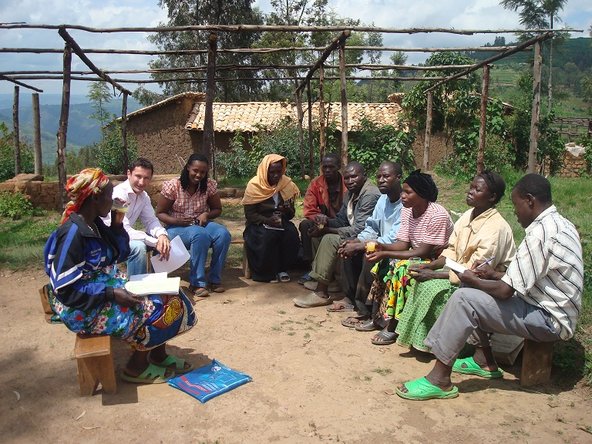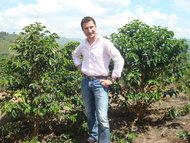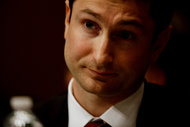 Fabrice P. Tourre spent time volunteering on a coffee farm in Rwanda.
Fabrice P. Tourre spent time volunteering on a coffee farm in Rwanda.
Fabrice P. Tourre is best known as “Fabulous Fab,” the former Goldman Sachs trader whose e-mails about the mortgage crisis became a symbol of Wall Street hubris and will now highlight the government’s case against him. As the economy was on the brink of collapse, e-mails show Mr. Tourre joked to a girlfriend that he sold toxic real estate bonds to “widows and orphans.”
But an inner circle of friends knows Mr. Tourre from very different dispatches — e-mail updates he sent from Africa during a stint as a volunteer. It was there that “Fabulous Fab,” a nickname he earned from a friend in New York, became known simply as “Breezy.”
“Rwandan coffee yields have significant room for improvements,” he wrote in a March 2011 message to friends, describing his adventure a world away from Wall Street. “Plenty of ideas and projects to focus on, with the ultimate goal to improve coffee farmers’ income and living conditions!”
 “Rwandan coffee yields have significant room for improvements,” Mr. Tourre wrote in a March 2011 message to friends.
“Rwandan coffee yields have significant room for improvements,” Mr. Tourre wrote in a March 2011 message to friends.
The e-mail, reviewed by The New York Times, provides a rare glimpse into Mr. Tourre’s life after Goldman, and after the Securities and Exchange Commission accused him of misleading investors about a mortgage security that ultimately failed. After his trip to Africa, Mr. Tourre enrolled in an economics doctoral program at the University of Chicago, where professors described him as a “standout” whom they selected as a teaching assistant for more junior students.
Related Links
 Interactive Timeline |
Interactive Timeline |  Documents
Documents- S.E.C. Hopes for Validation in Goldman Sachs Trader Case (July 9, 2013)
Mr. Tourre’s character will come into focus when his trial opens Monday in a federal courtroom in Lower Manhattan. The human elements of the case, which could be spotlighted when Mr. Tourre takes the witness stand, might sway a jury otherwise bogged down in the minutiae of high finance.
While Mr. Tourre’s time in Rwanda is unlikely to play a role in the trial, he may nonetheless come across as a dynamic professional. Working in his favor, he has already calmly faced a Senate committee. He speaks slowly, the hearing showed, careful to enunciate. Still, jurors may view him as another ambitious Wall Streeter, one with a distinctly foreign accent.
In what is considered the most prominent case stemming from the financial crisis, the S.E.C. is expected to paint Mr. Tourre as a brash up-and-comer at Goldman, willing to sell investors products that were sure to fail. Mr. Tourre’s lawyers, in contrast, could try to portray their client as a bit player in the crisis — a midlevel 28-year-old trader at the time of his actions — who has dedicated his time since Goldman to worthy causes and a life of the mind.
“Fabrice Tourre has done nothing wrong,” his lawyers, Pamela Chepiga and Sean Coffey, said in a statement. “He is confident that when all the evidence is considered, the jury will soundly reject the S.E.C.’s charge.”
Goldman was charged alongside Mr. Tourre, but chose to settle, paying what was at the time a record $550 million penalty, without admitting or denying guilt. That left Mr. Tourre to tackle the S.E.C. alone, though with Goldman’s resources financing his fight. Mr. Tourre no longer works for Goldman.
On the eve of trial, people close to Mr. Tourre say he remains calm. Douglas C. Weaver, a former Goldman executive who once supervised Mr. Tourre and had dinner with his former colleague a few months ago, said Mr. Tourre appeared upbeat.
“He is dealing with it fairly well,” he said. “He doesn’t feel he did anything wrong.” Mr. Weaver added, however, that the charges had upended Mr. Tourre’s life.
Mr. Tourre, now 34, was raised in a suburb of Paris, and went on to earn a degree in mathematics from the École Centrale Paris.
He first came to the United States in 1999, at age 20, taking a summer internship in Hamilton, Ohio, as a production worker on an assembly line producing heater cores and air-conditioning units for the French car-part manufacturer Valeo. He then attended Stanford, where he received a master’s degree in management science and engineering.
After college, he landed a summer intern spot at Goldman, a hypercompetitive program that leads to a full-time job for a select few. Mr. Tourre, among the survivors, began in Goldman’s corporate credit department, where he started out securitizing, or packaging and reselling, auto loans. He later moved into a troubleshooting role for financial institutions with soured loan portfolios.
 Doug Mills/The New York TimesFabrice Tourre, formerly of Goldman, faces claims that he was part of a conspiracy to mislead investors on a mortgage security.
Doug Mills/The New York TimesFabrice Tourre, formerly of Goldman, faces claims that he was part of a conspiracy to mislead investors on a mortgage security.
Within the firm, Mr. Tourre was known as a statistical wizard. One former co-worker, who spoke on the condition of anonymity because of a Goldman policy against speaking to the media, described Mr. Tourre as an “analytical nerd.”
In 2004, Mr. Tourre landed a job in Goldman’s mortgage department, then a thriving unit of the bank, and a year later was making enough money to afford a $3,250-a-month apartment in Manhattan’s West Village. In the mortgage unit, Mr. Tourre was tasked with creating synthetic collateralized debt obligations, or C.D.O.’s.
It was a big business on Wall Street. From 2005 through 2007, at least $1.03 trillion in C.D.O.’s were issued, according to Dealogic, a financial data firm. Goldman, during this period, was the sixth-largest issuer in the world.
A C.D.O., in essence, compiles a package of mortgage-backed bonds into one deal for investors to buy. A synthetic version of a C.D.O. is one that, rather than selling securities with the actual bonds, is arranged through an insurance contract that is linked to the bonds’ performance. One investor bets the bonds will fail; another bets they will succeed.
It was one of these deals that landed Mr. Tourre on the S.E.C.’s radar.
The agency’s case centers on the contention that in 2007 Mr. Tourre and Goldman sold investors a synthetic C.D.O. known as Abacus, while omitting a crucial fact: a hedge fund run by the billionaire John A. Paulson helped construct Abacus and then bet against it. When the mortgage market soured, a handful of sophisticated investors lost more than $1 billion on the deal.
Mr. Tourre’s defense team will counter that synthetic C.D.O.’s required someone to bet on a decline in value, a fact well known to the marketplace. The lawyers will argue that investors on both sides of the deal — those betting for and against it — knew what it contained.
In early 2011, after the S.E.C. announced its case, Mr. Tourre arrived in Kigali, Rwanda’s capital, with the task of creating business plans for local farmers. He would walk a dirt road to work, one roommate recalled, and was often the last to leave the office.
On weekends, the roommate said, Mr. Tourre would play in a local soccer game. Other times, he would watch European soccer at a bar, kicking back with a Mützig beer, a favorite, and meat brochettes.
Not unlike his tenure at Goldman, in Africa Mr. Tourre appeared to have a knack for innovation, except there it was in farming. The March 2011 e-mail to friends describes technology developments for Rwandan farmers, like using “spy-like chips” hidden in coffee beans to track whether crops are being stolen.
His e-mail to friends is also laden with exclamation points, a hallmark of his infamous Goldman missives. In describing a trip to Rwanda’s stock exchange, he recalled arriving on “the trading floor of the exchange on a Friday morning, in the middle of the trading day, to see … nobody!” The scarcity of people, he said, stemmed from the lack of local companies listing their shares. “The visit was a great experience over all, as it is rather unique to witness the birth of local capital markets.”
When he left Rwanda that July, Mr. Tourre returned to the United States to enter the Ph.D. program at the University of Chicago. He also joined an intramural soccer team there, the Bootstrappers, until an Achilles’ tendon injury that required surgery sidelined him for a period of time.
As with many of the people who met him in Chicago, Nancy L. Stokey, an economics professor, initially had no idea of Mr. Tourre’s legal woes. She found out only after he had served as a teaching assistant in one of her undergraduate classes. “He was one of my best students,” she said.
Robert Shimer, another of Mr. Tourre’s economics professors, agreed. “He’s someone who, if he continues on the same track, is going to be one of our top job market candidates.”
Article source: http://dealbook.nytimes.com/2013/07/14/after-goldman-and-before-trial-a-global-education-for-fabrice-tourre/?partner=rss&emc=rss
Speak Your Mind
You must be logged in to post a comment.